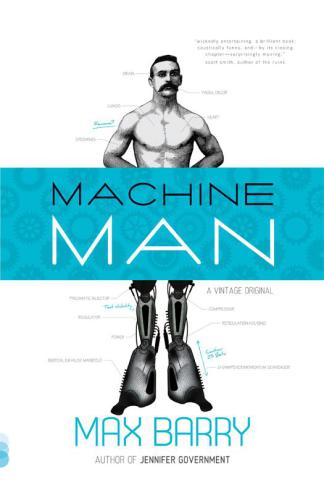
Machine Man
Vintage Contemporaries
کتاب های مرتبط
- اطلاعات
- نقد و بررسی
- دیدگاه کاربران
نقد و بررسی

June 13, 2011
RoboCop meets Nathanael West's A Cool Million in Barry's cautionary satire of the future of bio-augmentation. Dr. Charlie Neumann (get it?), an employee at the bioengineering company Better Future, loses his leg in an industrial accident and has it replaced with a prosthesis. After tinkering with and improving his artificial leg, Charlie loses his remaining good leg, but this time it's no accident; he likes being able to make artificial upgrades to his body. So do his employers, who see the military applications of Charlie's fixation and put him in charge of a project to modify the human body with mil-spec prostheses. When one of the other test subjects, a security guard who has had his arms replaced, goes rogue and kidnaps Lola Shanks, the prosthetics expert who has become the object of Charlie's affection, Charlie sets off to hunt down the monster he has helped to create. Like Mary Shelley's famous creation, this story and character are rather stitched together, and doesn't achieve a life or identity of its own. The result is a pastiche that, like Charlie, stays too wrapped up in its own head to grip the reader on a more emotional level.

July 1, 2011
A timid scientist becomes a military-grade bionic man in the latest corporate satire from Barry (Jennifer Government, 2003, etc.).
When we meet Charlie, the hero of the author's fourth novel, he's desperate to find the cell phone he's misplaced. He spots it soon enough in one of his employer's laboratories—he's an industrial engineer at a corporation called Better Future—but pays a terrible price when he loses a leg in a heavy-duty clamp as he tries to retrieve it. The lesson ought to be that we should take care how attached we get to our gadgets, but Charlie's takeaway is precisely the opposite; astounded at the progress made in prosthetic design and inspired with his own ideas to improve his artificial leg, he becomes convinced that technology can almost universally improve on flesh-and-blood anatomy. His doctors are aghast—especially when Charlie intentionally cuts off his other leg in the clamp—but he has a supporter in Lola, a prosthetics expert who becomes his love interest, and in his employers, who see lucrative military contracts in his creations. As in his previous novels, Barry takes scenarios that ought to be tragic and cannily reshapes them into smart, piercing comedy about contemporary workaday life. Here the target is both corporate greed and technological obsession, though this time the humor grows bleaker and more grotesque—Barry nervily explores how much of the body can be mechanized, right down to heartbeats and synapses. A love story emerges, as does a kind of ersatz superhero plot where Charlie battles a rival rigged with similar prostheses. But the author takes care to return to the central question of how much of our humanity we're willing to sacrifice for technology, and how much we already have.
Though this novel is notably darker than his other books, Barry still finds a smirking and at times uproarious way to expose our endless obsession with technological fixes.
(COPYRIGHT (2011) KIRKUS REVIEWS/NIELSEN BUSINESS MEDIA, INC. ALL RIGHTS RESERVED.)

July 1, 2011
Engineer Charlie Neumann, employed by military contractor Better Future, understands what it takes to keep up with technology's rapidly quickening forward march. After losing a leg in an industrial accident, he is appalled by the lack of technology available for human prostheses. Taking it upon himself to reengineer his prosthetic leg and faced with the incompatibility of his body, he has to decide how far he wants to reengineer his existing parts to fit his new technology. Machine Man focuses on the human drive for self-improvement, especially when it looks like self-destruction to an outsider. Barry's razor-sharp authorial voice perfectly articulates Charlie's inner desires, and anyone who's worked with, studied as, or loved an engineer will appreciate the host of in-jokes that pepper the novel. With clever commentary on the military-industrial complex and the modern consumer's desires, Barry brings a nerdy sense of humor to an entirely believable premise no longer limited to the realm of science fiction. Darkly comic, genuinely tender, with more than a few great fight scenes, this is a triumph.(Reprinted with permission of Booklist, copyright 2011, American Library Association.)

























دیدگاه کاربران